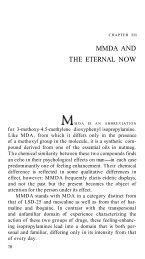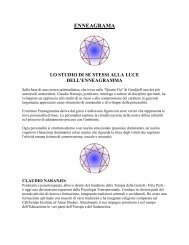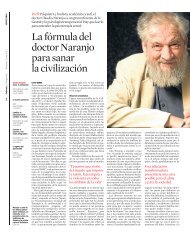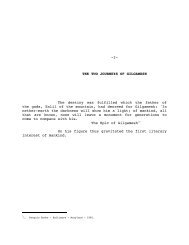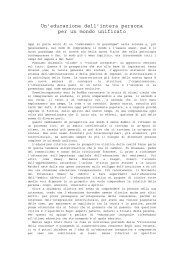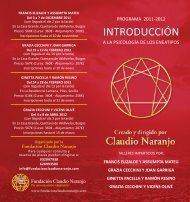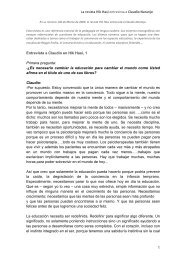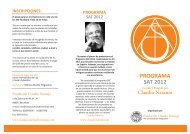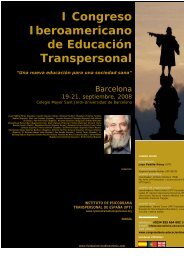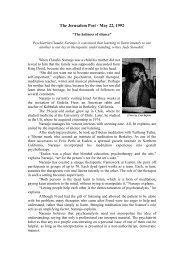Present – Centeredness in Gestalt Therapy Claudio Naranjo
Present – Centeredness in Gestalt Therapy Claudio Naranjo
Present – Centeredness in Gestalt Therapy Claudio Naranjo
Create successful ePaper yourself
Turn your PDF publications into a flip-book with our unique Google optimized e-Paper software.
someth<strong>in</strong>g other than "merely liv<strong>in</strong>g."<br />
This is not what the classic <strong>in</strong>junctions of present-centeredness convey. Take, for <strong>in</strong>stance, K<strong>in</strong>g<br />
Solomon's "A man hath no better th<strong>in</strong>g under the sun, than to eat, and to dr<strong>in</strong>k, and to be merry<br />
[Eccles. 15].” The character of this quotation, like that of most statements that stress the value of<br />
actuality, is hedonistic. And it could not be otherwise, for if the value of the present is not go<strong>in</strong>g to<br />
be for a future, it must be <strong>in</strong>tr<strong>in</strong>sic: the present must conta<strong>in</strong> its own reward.<br />
In our times the hedonistic outlook seems to be divorced from and to run counter to religious feel<strong>in</strong>g<br />
(just as to "prescription orientation" <strong>in</strong> general). Insofar as "body" and "m<strong>in</strong>d" are regarded as<br />
<strong>in</strong>compatible sources of value, idealism and spirituality tend to be associated with a grim asceticism,<br />
while the defense of pleasure is most often undertaken by the cynically practical, tough-m<strong>in</strong>ded, and<br />
hard-nosed "realists." This does not seem to have always been so, and we know that there was a<br />
time when religious feasts were real festivals. So, when we read Solomon's words <strong>in</strong> the Old<br />
Testament, we should not superimpose on them our present body-m<strong>in</strong>d split, or the<br />
tough-m<strong>in</strong>dedness with which those words are often repeated. Beh<strong>in</strong>d them was an outlook<br />
accord<strong>in</strong>g to which liv<strong>in</strong>g life and liv<strong>in</strong>g it now was a holy action, a way <strong>in</strong> accordance with God's will.<br />
Rarely do we f<strong>in</strong>d this balance of transcendence and immanence <strong>in</strong> Western thought, with the<br />
exception of remarkable <strong>in</strong>dividuals that seem to be marg<strong>in</strong>al to the spirit of the times - heretics to<br />
the religious, or madmen to the common folk. William Blake, for <strong>in</strong>stance, was such a man <strong>in</strong> claim<strong>in</strong>g<br />
that "eternity is <strong>in</strong> love with the productions of time."<br />
Even <strong>in</strong> psychoanalysis, which <strong>in</strong> practice has done much for mank<strong>in</strong>d's id, the "pleasure pr<strong>in</strong>ciple" is<br />
looked upon as a childishness and a nuisance that the "mature," reality-oriented ego must hold <strong>in</strong><br />
check.<br />
Contrariwise, <strong>Gestalt</strong> therapy sees a much stronger l<strong>in</strong>k between pleasure and goodness, so that its<br />
philosophy may be called hedonistic <strong>in</strong> the same sense as the good old hedonisms before the<br />
Christian era. I would like to suggest the notion of humanistic hedonism, which does not necessarily<br />
entail a theistic outlook and yet seems to dist<strong>in</strong>guish this approach from the egoistic hedonism of<br />
Hobbes, the utilitarian hedonism of J. S. Mill, and that of the ord<strong>in</strong>ary pleasure seeker. (If at this po<strong>in</strong>t<br />
the reader wonders how <strong>Gestalt</strong> therapy can be called ascetic and hedonistic at the same time, let<br />
him remember that <strong>in</strong> Epicurus's view the most pleasurable life was one devoted to philosophical<br />
reflection while on a simple diet of bread, milk, and cheese.) ...<br />
PRESENT-CENTEREDNESS AS IDEAL<br />
Der den Augenblick ergreift/Das ist der rechte Mann.<br />
He who seizes the moment is the right man.<br />
Goethe<br />
The word ideal needs clarification. Ideals are frequently understood with a connotation of duty<br />
and/or <strong>in</strong>tr<strong>in</strong>sic goodness that is foreign to the philosophy of <strong>Gestalt</strong> therapy. If we deprive an ideal<br />
of its quality of should or ought, it rema<strong>in</strong>s as either a statement of the desirable way to an end -<br />
that is, a prescription - or else a "rightness." By this I mean an expression of goodness rather than a<br />
means or an <strong>in</strong>junction: a sign or symptom of an optimal condition of life. This is the sense <strong>in</strong> which



